Mcdonald v chicago 2010 - Study guides, Class notes & Summaries
Looking for the best study guides, study notes and summaries about Mcdonald v chicago 2010? On this page you'll find 40 study documents about Mcdonald v chicago 2010.
Page 3 out of 40 results
Sort by
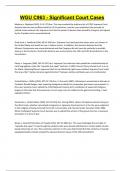
-
WGU C963 - Court Cases - American Politics and the US Constitution
- Exam (elaborations) • 4 pages • 2023
-
Available in package deal
-
- $9.79
- + learn more
WGU C963 - Court Cases - American Politics and the US Constitution Marbury v. Madison (1803) Established judicial review. The courts have the power to strike down laws that they find to violate the Constitution. Dred Scott v. Sanford (1857) The Constitution was not meant to include American citizenship for black people. Plessy v. Ferguson (1896) Separate but equal - Racial segregation laws for public facilities are Constitutional as long as the segregated facilities were equal in qua...

-
WGU C963 Court Cases
- Exam (elaborations) • 4 pages • 2023
-
Available in package deal
-
- $9.89
- + learn more
WGU C963 Court Cases Marbury v. Madison Ans- This case involved the Judiciary Act of 1789. The Supreme Court declared that the law conflicted with the U.S. Constitution, and the case established the principle of judicial review wherein the Supreme Court has the power to declare laws passed by Congress and signed by the president to be unconstitutional. Dred Scott v. Sanford Ans- Supreme Court case that decided US Congress did not have the power to prohibit slavery in federal territorie...
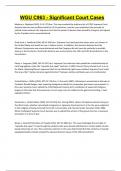
-
WGU C963 - Significant Court Cases
- Exam (elaborations) • 4 pages • 2023
-
Available in package deal
-
- $9.99
- + learn more
WGU C963 - Significant Court Cases Marbury v. Madison (1803, 5 US 137) Ans- This case involved the Judiciary Act of 1789. Supreme Court declared that the law conflicted with the US Constitution, and the case established the principle of judicial review wherein the Supreme Court has the power to declare laws passed by Congress and signed by the President to be unconstitutional. Dred Scott v. Sandford (1856, 60 US 393) Ans- Supreme Court declared that slaves were not citizens of the Unit...
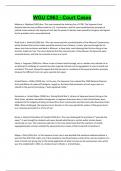
-
WGU C963 - Court Cases
- Exam (elaborations) • 4 pages • 2023
-
Available in package deal
-
- $9.79
- + learn more
WGU C963 - Court Cases Marbury v. Madison (1803) Ans- This case involved the Judiciary Act of 1789. The Supreme Court declared that the law conflicted with the U.S. Constitution, and the case established the principle of judicial review wherein the Supreme Court has the power to declare laws passed by Congress and signed by the president to be unconstitutional. Dred Scott v. Sanford (1856) Ans- This case concerned the constitutionality of the Missouri Compromise, which declared that ce...
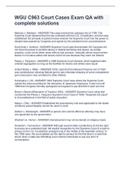
-
WGU C963 Court Cases Exam QA with complete solutions
- Exam (elaborations) • 4 pages • 2022
-
- $8.99
- + learn more
Marbury v. Madison - ANSWER This case involved the Judiciary Act of 1789. The Supreme Court declared that the law conflicted with the U.S. Constitution, and the case established the principle of judicial review wherein the Supreme Court has the power to declare laws passed by Congress and signed by the president to be unconstitutional. Dred Scott v. Sanford - ANSWER Supreme Court case that decided US Congress did not have the power to prohibit slavery in federal territories and slaves, as pri...
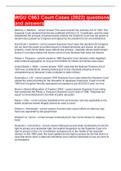
-
WGU C963 Court Cases(2022)questions and answers
- Exam (elaborations) • 4 pages • 2022
- Available in package deal
-
- $9.49
- + learn more
WGU C963 Court Cases(2022)questions and answers Marbury v. Madison This case involved the Judiciary Act of 1789. The Supreme Court declared that the law conflicted with the U.S. Constitution, and the case established the principle of judicial review wherein the Supreme Court has the power to declare laws passed by Congress and signed by the president to be unconstitutional. Dred Scott v. Sanford Supreme Court case that decided US Congress did not have the power to prohibit slavery in fe...
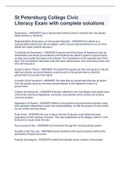
-
St Petersburg College Civic Literacy Exam with complete solutions
- Exam (elaborations) • 12 pages • 2022
-
Available in package deal
-
- $9.49
- + learn more
Democracy - ANSWER-Type of government where power is derived from the people, either directly or indirectly. Representative Democracy or Democratic Republic - ANSWER-An indirect or a representative democracy where eligible voters choose representatives to act on their behalf and make political decisions. Constitutional Democracy - ANSWER-A government that draws its legitimacy from an authoritative document (a constitution) that defines the nation's system of government, its laws and usual...
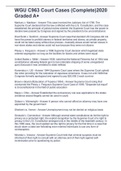
-
WGU C963 Court Cases (Complete)2020 Graded A+
- Exam (elaborations) • 3 pages • 2022
-
Available in package deal
-
- $8.99
- + learn more
Marbury v. Madison This case involved the Judiciary Act of 1789. The Supreme Court declared that the law conflicted with the U.S. Constitution, and the case established the principle of judicial review wherein the Supreme Court has the power to declare laws passed by Congress and signed by the president to be unconstitutional. Dred Scott v. Sanford Supreme Court case that decided US Congress did not have the power to prohibit slavery in federal territories and slaves, as private property,...
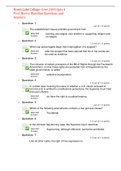
-
North Lake College: Govt 2305 Quiz 4 Prof. Sherry Sharifian Questions and Answers,100% CORRECT
- Exam (elaborations) • 7 pages • 2022
-
Available in package deal
-
- $16.49
- + learn more
North Lake College: Govt 2305 Quiz 4 Prof. Sherry Sharifian Questions and Answers • Question 1 The establishment clause prohibits government from out of 1.5 points Selected Answer: • Question 2 favoring one religion over another or supporting religion over no religion. 1.5 out of 1.5 points When can police legally begin their interrogation of a suspect? Selected Answer: • Question 3 after the suspect has been warned that his or her words can be ...
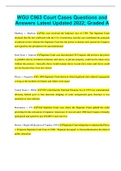
-
WGU C963 Court Cases Questions and Answers Latest Updated 2022; Graded A
- Exam (elaborations) • 5 pages • 2022
-
Available in package deal
-
- $9.99
- + learn more
WGU C963 Court Cases Questions and Answers Latest Updated 2022; Graded A Marbury v. Madison This case involved the Judiciary Act of 1789. The Supreme Court declared that the law conflicted with the U.S. Constitution, and the case established the principle of judicial review wherein the Supreme Court has the power to declare laws passed by Congress and signed by the president to be unconstitutional. Dred Scott v. Sanford Supreme Court case that decided US Congress did not have the power to prohi...

That summary you just bought made someone very happy. Also get paid weekly? Sell your study resources on Stuvia! Discover all about earning on Stuvia


